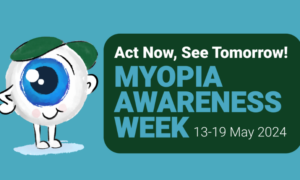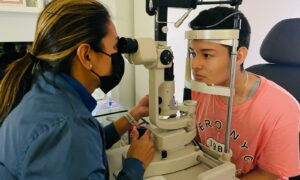April 1, 2022
By Dwight Akerman, OD, MBA, FAAO, FBCLA, FIACLE
Often, I ask optometrists if they offer myopia care services and products in their practices. The responses range from a blank stare to an enthusiastic “yes!” Those who give a blank stare eventually tell me why they have not implemented myopia management. The purported reasons include not enough patient demand, not being comfortable examining/treating children, not having enough room in the practice, not wanting to invest in the necessary equipment, and “I’m as busy as I want to be.”
Those optometrists who provide me with an enthusiastic “yes!” tell me that myopia is an epidemic and that it is critical to provide full-scope myopia care to children. These practitioners have invested in myopia management training for themselves and their staff. This advanced group of practitioners has also invested in an optical biometer and a corneal topographer. They prescribe all currently available (in the U.S.) treatment modalities to slow the progression of juvenile-onset myopia, i.e., lifestyle modifications, orthokeratology, topical low-dose atropine, dual-focus/multifocal soft lenses, and bifocal spectacles.
It is difficult to estimate the percentage of U.S. eye care practitioners who provide comprehensive pediatric myopia management. However, it is evident that the percentage is growing. I have hosted several virtual one-hour myopia continuing education programs for Review of Myopia Management over the past two years, and attendance exceeded 1,000 eye care professionals at most. Another data point is from CooperVision: nearly 6,000 U.S. eye care professionals have been trained in comprehensive myopia management through the CooperVision MiSight Certification program (source: CooperVision).
Suppose you do not wish to practice myopia management or only want to prescribe a limited number of treatments. In that case, I urge you to refer to a qualified optometric colleague who offers full-scope myopia care. Most optometrists routinely refer complex ocular disease patients to an ophthalmologist. However, many optometrists are reluctant to refer myopic children to a competent optometric colleague for fear the patient and family will not return for routine care and/or glasses. Meet with your myopia care colleague(s) and discuss the referral/comanagement protocol to avoid surprises. It can be a win for the myopic child, a win for the consulting optometrist, and a win for you — the referring optometrist.
Optometric referral doesn’t have to be an oxymoron.
Best professional regards,

Dwight H. Akerman, OD, MBA, FAAO, FBCLA, FIACLE
Chief Medical Editor
dwight.akerman@gmail.com













